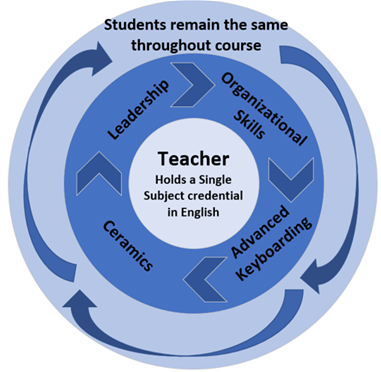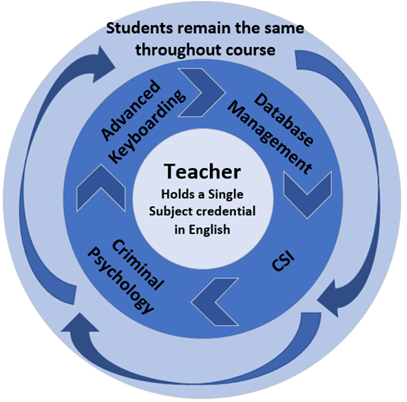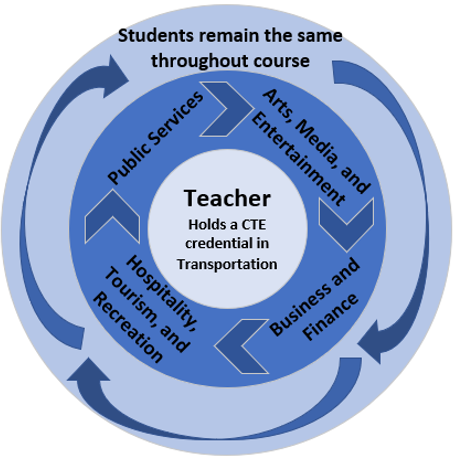Wheel courses may be referred to as Exploratory, Wheel, Enrichment, Activity, or Introductory classes which are mostly offered by middle and elementary schools. In these classes, educators teach several subjects during a one- or two-semester course, thereby offering the students an opportunity to explore topics that they may wish to take in the future. The content of these classes in General Education typically involves electives that do not fall into one or more of the broad statutory subject areas, and may not include Career Technical Education (CTE) survey content. CTE exploratory courses often provide a survey of either multiple industry sectors or multiple pathways within one industry sector.
The information provided is designed to serve as guidance only. Local educational agencies are responsible to thoroughly review relevant Statutes and Regulations and determine the appropriateness of an assignment at the local level.
Reporting Wheel Course Assignments
General Education: A general education wheel course should be reported with the CALPADS State Course Code of 9228. Additionally, Title 5 §80005(b) authorizes an educator holding a credential based on a bachelor’s degree and student teaching to teach an elective in a Departmentalized setting in grades K-12. Therefore, any fully credentialed teacher may be appropriately assigned for courses identified with this course code in combination with provisions outlined in the Local Assignment Option under Title 5 §80005(b), provided that the content of the course does not fall in one or more of the content areas.
General Education Wheel Elective Assignment Provided Flexibility with T5 §80005(b)
If a teacher is assigned to a course that offers a group of students a survey or introduction to a variety of elective content areas that rotate or change after a limited number of weeks (or each trimester), then this would be considered a Wheel Elective. In this scenario, the student group would remain with the teacher for the entire assignment, and the content being taught by the teacher would rotate.

The wheel elective course displayed above is provided flexibility with the use of Local Assignment Option Title 5 §80005(b) for the following reasons:
- The primary content of the subjects rotating do not fall within a broad subject area
- The students remain the same throughout the entire course
- The educator holds a full teaching credential based on a bachelor’s degree and student teaching.
Note, the primary course content is what drives the assignment. As each content area in this example only make up 25% of the course content, there is no primary content area that falls within a broad subject area authorized by a Commission-issued document.
General Education Wheel Assignments Not Provided Flexibility with T5 §80005(b)
If the course content is in a subject area that falls within the statutory subjects, then an appropriately credentialed teacher must be assigned. For example, if a single teacher is assigned for the full year to teach a specific content area that is authorized by one of the Single Subject Teaching Credential content areas, and only the students change and rotate through, then this is not afforded flexibility with the use of Local Assignment Option Title 5 §80005(b) and the appropriate Single Subject Teaching credential is required.
.jpg?sfvrsn=76b12db1_12)
The wheel elective course displayed above is NOT afforded flexibility with the use of Local Assignment Option Title 5 §80005(b) for the following reasons:
- The student group rotates throughout the course
- Art is a statutory subject and therefore the educator must hold an Art authorization
Note, the wheel course depicted above includes introductory content in different areas of art and encompasses only a broad single subject area, and should be reported in CALPADS accordingly. For example, this course should be reported as the appropriate CALPADS State Course Code for the Art content. Then the Non-Course Instructional Level Code 21 may be reported to indicate that the course content level provides a broad baseline of introductory content over multiple content areas. Regardless of the instructional level code reported, the educator must be appropriately authorized for the subject being taught.
-non-appropriate-wheel-course-art-content.jpg?sfvrsn=80b02db1_6)
The wheel elective course displayed above is NOT afforded flexibility with the use of Local Assignment Option Title 5 §80005(b), even though the student group remains the same and the content being taught is rotating. Flexibility is not afforded for the following reason:
- The subject content areas of Drawing, Sculpture, Art History, and Watercolor all fall within the broad subject area of Art. Therefore, the educator must hold an Art authorization.
As with the previous example, this course must be reported in CALPADS with the appropriate State Course Code for the Art content. Then the Non-Course Instructional Level Code 21 may be reported to indicate that the course content level provides a broad baseline of introductory content over multiple content areas. Regardless of the instructional level code reported, the educator must be appropriately authorized for the subject being taught.

The wheel elective course displayed above is NOT afforded flexibility with the use of Local Assignment Option Title 5 §80005(b), even though the student group remains the same and the content being taught is rotating. Flexibility is not afforded for the following reason:
- The subject content areas include Advanced Keyboarding, Database Management, CSI, and Criminal Psychology. The content areas of Advanced Keyboarding and Database Management make up 50% of the entire course and are authorized by a Computer Science authorization. The primary course content is what drives the assignment. Therefore, as the primary course content involves subjects for which the Commission issues a document, that authorization is required.
General Education Wheel Elective Courses and Core Settings
Wheel elective courses can be cored, if the student groups remain the same throughout the entire year (even as each elective subject changes). Note that it is not common to core wheeled elective courses because students are often given a choice in what elective they wish to take, making it difficult to ensure that the student population remains the same throughout the wheel schedule.
An appropriate core schedule with a wheel configuration is depicted below:
CTE Wheel Courses Provided Flexibility
If a teacher is assigned to a course that offers a group of students the opportunity to explore multiple CTE industry sectors, allowing them to make a more confident decision about which one to pursue, then this would be an Exploratory CTE course that should be reported with CALPADS course code 7000. In this scenario, the student group would remain with the teacher for the entire assignment, and the content being taught by the teacher would rotate.

The Exploratory CTE course displayed above is afforded flexibility in that a CTE credential in any industry sector would be appropriate, as the primary course content does not fall within one industry sector. Therefore, the CTE credential in Transportation is an appropriate authorization for the assignment.
Note, a general education teacher is never appropriate to teach CTE unless they hold a Single Subject teaching credential with one of the following authorizations: Agriculture, Business, Home Economics, and Industrial Arts/Technology Education. Therefore, given the flexibility afforded for the Exploratory CTE course displayed above, a teacher with any one of these Single Subject authorizations would also be an appropriate assignment.
CTE Wheel Courses Not Provided Flexibility
If a teacher is assigned to a course that offers a group of students the opportunity to explore multiple CTE pathways within one industry sector, then this would be an Exploratory CTE course that should be reported with CALPADS course code 7000. In this scenario, the student group would remain with the teacher for the entire assignment, and the content being taught by the teacher would rotate.

The Exploratory CTE course displayed above is NOT afforded flexibility, as the course content covers multiple pathways within one industry sector. Therefore, based on the content covered the educator must hold a CTE credential in Engineering and Architecture. The CTE credential in Transportation is not appropriate for this assignment.
Note, a general education teacher is never appropriate to teach CTE unless they hold a Single Subject teaching credential with one of the following authorizations: Agriculture, Business, Home Economics, and Industrial Arts/Technology Education. Given that the example above requires the teacher to be authorized in the industry sector taught, one of these Single Subject teaching credentials is only authorized if the authorization aligns with that industry sector.
.png?sfvrsn=c28b72b1_10)
.png?sfvrsn=cd8b72b1_0)
appropriate-wheel-course-setting.jpg?sfvrsn=4ba2db1_7)